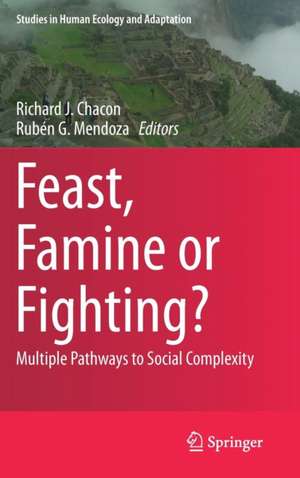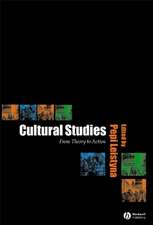Feast, Famine or Fighting?: Multiple Pathways to Social Complexity: Studies in Human Ecology and Adaptation, cartea 8
Editat de Richard J. Chacon, Rubén G. Mendozaen Limba Engleză Hardback – 27 ian 2017
However, recent approaches such as the inclusion of bioarchaeological perspectives, prospection methods, systematically-investigated archaeological sites along with emerging technologies are necessarily transforming our understanding of socio-cultural evolutionary processes. In short, many pre-existing ways of explaining the origins and development of social complexity are being reassessed.
Ultimately, the contributors to this edited volume challenge the status quo regarding how and why social complexity arose by providing revolutionary new understandings of social inequality and socio-political evolution.
| Toate formatele și edițiile | Preț | Express |
|---|---|---|
| Paperback (1) | 1118.45 lei 6-8 săpt. | |
| Springer International Publishing – 18 iul 2018 | 1118.45 lei 6-8 săpt. | |
| Hardback (1) | 1124.78 lei 6-8 săpt. | |
| Springer International Publishing – 27 ian 2017 | 1124.78 lei 6-8 săpt. |
Preț: 1124.78 lei
Preț vechi: 1371.68 lei
-18% Nou
Puncte Express: 1687
Preț estimativ în valută:
215.26€ • 223.90$ • 177.70£
215.26€ • 223.90$ • 177.70£
Carte tipărită la comandă
Livrare economică 15-29 aprilie
Preluare comenzi: 021 569.72.76
Specificații
ISBN-13: 9783319484013
ISBN-10: 331948401X
Pagini: 490
Ilustrații: XXIX, 490 p. 149 illus., 108 illus. in color.
Dimensiuni: 155 x 235 x 29 mm
Greutate: 0.9 kg
Ediția:1st ed. 2017
Editura: Springer International Publishing
Colecția Springer
Seria Studies in Human Ecology and Adaptation
Locul publicării:Cham, Switzerland
ISBN-10: 331948401X
Pagini: 490
Ilustrații: XXIX, 490 p. 149 illus., 108 illus. in color.
Dimensiuni: 155 x 235 x 29 mm
Greutate: 0.9 kg
Ediția:1st ed. 2017
Editura: Springer International Publishing
Colecția Springer
Seria Studies in Human Ecology and Adaptation
Locul publicării:Cham, Switzerland
Cuprins
Chapter 1:.- Introduction.- Chapter 2: Violence, Warriors, and Rock Art in Bronze Age Scandinavia.- Chapter 3: Societal Dynamics of Prestate Societies of the North Central European Plains, 600-900 CE.- Chapter 4: Trade and State Formation in Ancient East African Coast and Southern Zambezia.- Chapter 5: Feasting, Social Complexity and the Emergence of the Early Neolithic of Upper Mesopotamia: A View from Göbekli Tepe.- Chapter 6: Highly Stratified Societies without Permanent Leadership: Yi in Liangshan of Southwestern China.- Chapter 7: Coercive Power and State Formation in Northern Vietnam.- Chapter 8: The Emergence of Sociopolitical Complexity: Evidence from Contact-era New Guinea.- Chapter 9: Tibenuk and Chuji: Status Attainment and Collective Action in Egalitarian Settings.- Chapter 10: Early Pueblo Great House Communities and Their Leaders: The Transformation of Community Leadership in the Mesa Verde and Chaco Regions, A.D. 625–1025.- Chapter 11: The Development of Complex Societies in Eastern North America: The Roles of Feasting, Famine, and Fighting.- Chapter 12: The Feast before Famine and Fighting: The Origins and Consequences of Social Complexity in the Mirador Basin, Guatemala.- Chapter 13: Tollan Teotihuacan: Multiethnic Mosaics, Corporate Interaction, and Social Complexity in Mesoamerica.- Chapter 14: Pathways to Social Complexity in the Norte Chico Region of Peru.- Chapter 15: How Chiefdom and Early State Social Structures Resolve Collective Action Problems.- Chapter 16: Commentary.- Chapter 17: Multiple Pathways to Large-Scale Human Cooperative Networks: A Reframing.
Notă biografică
Richard J. Chacon is an Associate Professor of Anthropology at Winthrop University. He has conducted ethnographic fieldwork in Amazonia among the Yanomamo of Venezuela, the Yora of Peru and the Achuar (Shiwiar) of Ecuador. In the Andes, he has conducted ethnographic fieldwork among the Otavalo and Cotacachi Indians of Highland Ecuador. His research interests include collective action, optimal foraging theory, indigenous subsistence strategies, natural resource conservation, warfare, belief systems, the development of social complexity, ethnohistory, ethics and the effects of globalization on indigenous peoples.
Dr. Rubén G. Mendoza is Professor and Chair of the Division of Social, Behavioral, and Global Studies at the California State University, Monterey Bay. He has conducted archaeological and ethnohistorical investigations in California, Colorado, the US Southwest, and Mesoamerica. His research interests include Mesoamerican and South American civilizations and social complexity, long-distance trade and exchange, conflict interaction, and Hispanicized Indian and Amerindian traditional technologies and material cultures. In addition, he is the coordinator for both the Archaeological Science, Technology, and Visualization, and Global Studies, programs at CSU Monterey Bay.
Contact information: Dr. Rubén G. Mendoza, Ph.D., RPA, Professor/Chair, Division of Social, Behavioral & Global Studies, California State University, Monterey Bay, Seaside, CA, USA. E-mail: rumendoza@csumb.edu
Dr. Rubén G. Mendoza is Professor and Chair of the Division of Social, Behavioral, and Global Studies at the California State University, Monterey Bay. He has conducted archaeological and ethnohistorical investigations in California, Colorado, the US Southwest, and Mesoamerica. His research interests include Mesoamerican and South American civilizations and social complexity, long-distance trade and exchange, conflict interaction, and Hispanicized Indian and Amerindian traditional technologies and material cultures. In addition, he is the coordinator for both the Archaeological Science, Technology, and Visualization, and Global Studies, programs at CSU Monterey Bay.
Contact information: Dr. Rubén G. Mendoza, Ph.D., RPA, Professor/Chair, Division of Social, Behavioral & Global Studies, California State University, Monterey Bay, Seaside, CA, USA. E-mail: rumendoza@csumb.edu
Textul de pe ultima copertă
The advent of social complexity has been a longstanding debate among social scientists. Existing theories and approaches involving the origins of social complexity include environmental circumscription, population growth, technology transfers, prestige-based and interpersonal-group competition, organized conflict, perennial wartime leadership, wealth finance, opportunistic leadership, climatological change, transport and trade monopolies, resource circumscription, surplus and redistribution, ideological imperialism, and the consideration of individual agency.
However, recent approaches such as the inclusion of bioarchaeological perspectives, prospection methods, systematically-investigated archaeological sites along with emerging technologies are necessarily transforming our understanding of socio-cultural evolutionary processes. In short, many pre-existing ways of explaining the origins and development of social complexity are being reassessed.
Ultimately, the contributors to this edited volume challenge the status quo regarding how and why social complexity arose by providing revolutionary new understandings of social inequality and socio-political evolution.
However, recent approaches such as the inclusion of bioarchaeological perspectives, prospection methods, systematically-investigated archaeological sites along with emerging technologies are necessarily transforming our understanding of socio-cultural evolutionary processes. In short, many pre-existing ways of explaining the origins and development of social complexity are being reassessed.
Ultimately, the contributors to this edited volume challenge the status quo regarding how and why social complexity arose by providing revolutionary new understandings of social inequality and socio-political evolution.
Caracteristici
Discusses the multiple pathways by which social complexity first emerged on a global scale of analysis Includes contributions from some of the most influential and internationally-recognized scholars and experts in their respective fields Includes supplementary material: sn.pub/extras




















